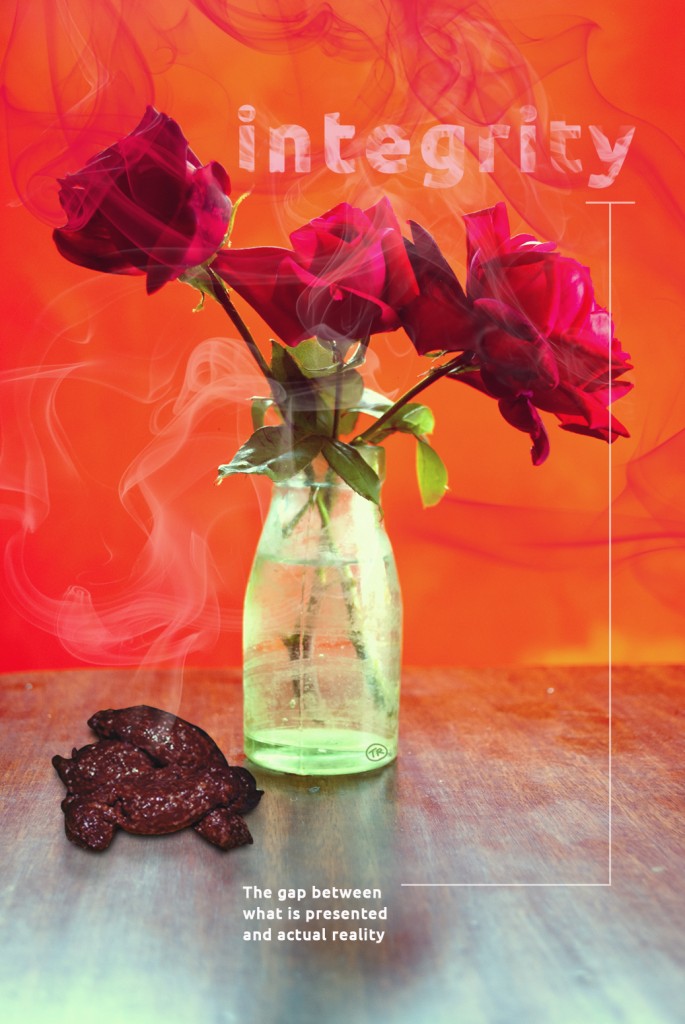Scott’s Fierce Conversations Principle 1: Interrogate reality to measure integrity – when everything smells like roses

We have a running joke in my house related to certain bodily odours. The conversation goes: “Ugh, what’s that smell?” followed by a standard response of “Mmmm… smells like roses.”
The joke is based on articulating the gap between what everyone knows to be true and what is said. Everyone in the room knows that we do not smell roses. No matter how adamant or persuasive I may be, there is no way my words will change the fact that what is assailing our nostrils is unrelated to something pleasant like flowers.
The first principle: Interrogate reality
I ponder this metaphor as I consider the first principle from Susan Scott’s book Fierce Conversations. The book can reinforce who you are, act as a confronting reminder of who you once were, or expose you to who you need to be. The underlying premise of the first principle in the book is to have what Scott calls “fierce conversations” to assess the gap between the official line and what is actually happening. By definition…
“Fierce does not mean barbarous, menacing or cruel. Fierce means powerful, strong, unbridled, unrestrained, robust. It means coming from behind ourselves into a conversation and making it real. There will be no blood on the floor; no violence.”
It is though these conversations that you “confront the real issues. Confront does not mean argue or beat up. Confront means search for truth. Honesty means full disclosure… with good intent.”
It is though these conversations and the act of “coming from behind ourselves” that you expose the “ground truth”, the conversations that occur outside of the company line or corporate statements. It is what is not said in corporate meetings in order to maintain status quo.
The gap between this ground truth and what is said determines your “immune systems” that you have as an individual, in your relationships, and in your organisation. When bad things happen, and they will in the dynamic environments in which we operate, a poor immune system from a long-term disconnect in truth can mean the individual, relationship or organisation may not recover. If, however, there is a strong alignment in the values that are spoken and exhibited, then defence systems kick in to make the relationship and organisation resilient.
Integrity: When it doesn’t smell like roses
The size of this gap between what is said and what is done is defined as integrity, which is felt most when it is missing. At first, using the metaphor from the image, you may have slight whiffs of something that smells odd. Rather than dealing with the underlying “crap”, you might apply effort to add more roses or replace the roses once they die. Others around you might recognise the bad smell from experience and leave, while others become accustomed to the smell and accept the smell as normal.
The book goes on to say that this gradual acceptance aligns with the premise that “you get what you tolerate”. Other confronting sentiments are that “people repeat behaviour that is rewarded”. Long-term negligence of addressing value gaps lends itself to asking the question “were my employees dead when I hired them, or did I kill them?”.
As the environmental compliance officer in a manufacturing company, I once had the opportunity to tour a downstream sewage treatment facility. I watched my smiling tour guide with interest as I gagged on the smell around me. Thinking about the experience as another olfactory metaphor:
- Integrity aligns with the lowest common denominator. If what is offensive is not removed, it will be accepted as the new standard.
- Integrity is relative to what is said and what is real. The treatment plant did not purport to be a rose garden. Integrity can be achieved either by removing what is offensive or by clearly accepting what is offensive. Both options can be considered.
Application: Gap finding
Criticism is easy. There is no lack of ammunition from management books and leadership lists to fuel those who would tear down individuals, relationships, and organisations. Care needs to be taken to avoid the perverse pleasure found in exposing the fact that there may be a steaming pile of poo under the roses we see in other’s lives.
Fierce conversations need to happen in relationships and organisations in the same manner that we would wish to have with ourselves. Discovering the source of something smelly can be confronting to those who are found holding it and offensive to those who discover it. These conversations need to be uncompromising and immediate, but with the same care and concern for the welfare of the people and entities involved that we would wish if someone were to approach us on a similar topic.
There are times when we cannot see what smells in our lives or what we have put up to mask the smell, so others may get involved. The request I hear most in employee reviews is to expose the potential, to provide that external input on how the employee can improve. This input can be increasingly rare as people move through their career. I have concerns as a leader that those around me would not feel they can tell me gaps they see in me or my organisation. Worse is if they feel they have told me and I have not listened.
The fierce conversation starts with ourselves, where we examine on a regular basis where there may be gaps between our values and our actions. Alignment in this area will make it easier to have considerate yet fierce conversations in our relationships. Given that organisations are made up of people, healthy relationships equate to healthy organisations.


Good post Chad. Great metaphor. That poo is too realistic though. It does my head in.